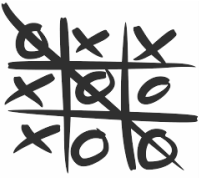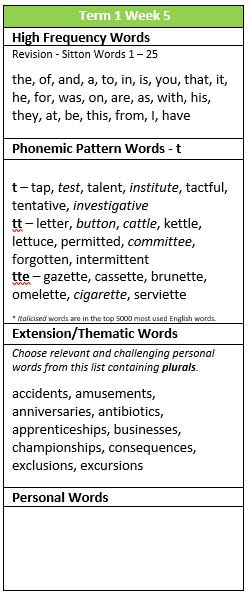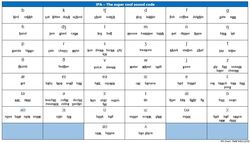Spelling Games - something for the whole family
Keen to have a little spelling fun with your family away from the computer?
Try this playful learning idea - Spelling Noughts and Crosses.
Here are the rules:
Write out your spelling list for this week and give a copy to both players. On your turn, flip your list so that you can’t see the words and ask your partner to choose a word for you to spell. If you get it right, you can place a symbol on the board. If you get it wrong you miss your turn. All other rules are like traditional Noughts and Crosses.
Can you spell and think strategically?
Who is the champion in your family?
Try this playful learning idea - Spelling Noughts and Crosses.
Here are the rules:
Write out your spelling list for this week and give a copy to both players. On your turn, flip your list so that you can’t see the words and ask your partner to choose a word for you to spell. If you get it right, you can place a symbol on the board. If you get it wrong you miss your turn. All other rules are like traditional Noughts and Crosses.
Can you spell and think strategically?
Who is the champion in your family?
Our favourite class spelling games now have their own pages ...
Spelling Structure
A strong vocabulary is one of the most important tools for communication.
This year, our goal is to help you build your writing and spelling vocabulary, in a fun way, at a level that's just right for you.
Each week, you'll be challenged to learn 20 new words tailored just to you.
We'll begin on a Monday, by attempting to spell 50 different words from a list of 25 high frequency words and 25 phonemic pattern words.
Any errors from those lists will then become part of your list of personal words for the week.
If you make fewer than 20 errors, you will then be given the opportunity to select your own challenge words from a list of carefully selected 'pattern' words or to include interesting or problematic words from your reading and writing that week.
Then, throughout the week, we'll play games and complete study activities (see below) designed to help you memorise both the spelling and usage of your very own word list, before putting our learning to the test at the end the week. It's going to be fun!
Here's a little more about how the word lists have been designed and why.
This year, our goal is to help you build your writing and spelling vocabulary, in a fun way, at a level that's just right for you.
Each week, you'll be challenged to learn 20 new words tailored just to you.
We'll begin on a Monday, by attempting to spell 50 different words from a list of 25 high frequency words and 25 phonemic pattern words.
Any errors from those lists will then become part of your list of personal words for the week.
If you make fewer than 20 errors, you will then be given the opportunity to select your own challenge words from a list of carefully selected 'pattern' words or to include interesting or problematic words from your reading and writing that week.
Then, throughout the week, we'll play games and complete study activities (see below) designed to help you memorise both the spelling and usage of your very own word list, before putting our learning to the test at the end the week. It's going to be fun!
Here's a little more about how the word lists have been designed and why.
|
Term 2 Spelling Lists
Don't forget to practise at home during the week too! As you know, regular practice really helps with memory and fluency. Here are some games and activity ideas to get you started ...
Why not start your learning with a crossword?
You may even like to try this one with a family member.
Hint: Don't forget, every word in this puzzle will contain the phoneme that we are studying for the week. Think carefully about how it might be spelt.
Hint: Don't forget, every word in this puzzle will contain the phoneme that we are studying for the week. Think carefully about how it might be spelt.
More Spelling Activities
When building your spelling vocabulary it is useful to focus on two different types of practice. One targets the actual spelling of the word, the other focuses on how to use the word in context.
Over the course of the week, try to complete at least one activity from the Word Properties and Memorisation document, and one from the Word Meaning and Usage. You'll soon see the results.
Over the course of the week, try to complete at least one activity from the Word Properties and Memorisation document, and one from the Word Meaning and Usage. You'll soon see the results.
Need a dictionary?
Need a dictionary to help you with your spelling practice? Try this free online dictionary from Oxford.
The International Phonetic Alphabet - our /siːkrət/ /læŋɡwɪdʒ/ code.
Click the pic for a larger pop-out IPA chart that you can use to help your spelling or to write secret messages.
Why not challenge your family to write their names using the IPA or leave a secret message for them somewhere in the house? Have some fun and build your skills at the same time.
Like to practise your phonic knowledge online? Try this.
Vocabulary Building Ideas for Independent Learners
Are you an independent learner looking to build your vocabulary but you're not sure where to start? Ask Matt for ideas about how you can use these documents to help you with your goals and growth.
|
| ||||||||||||









